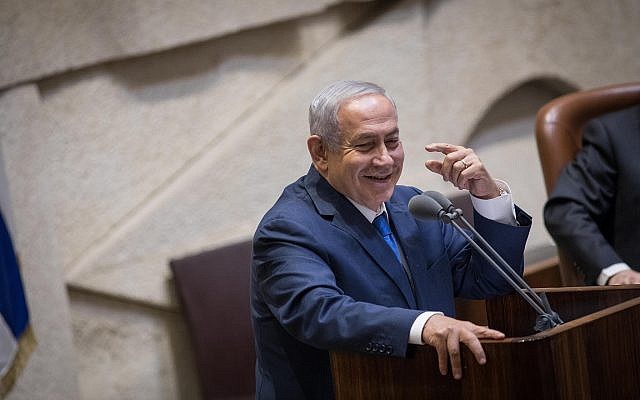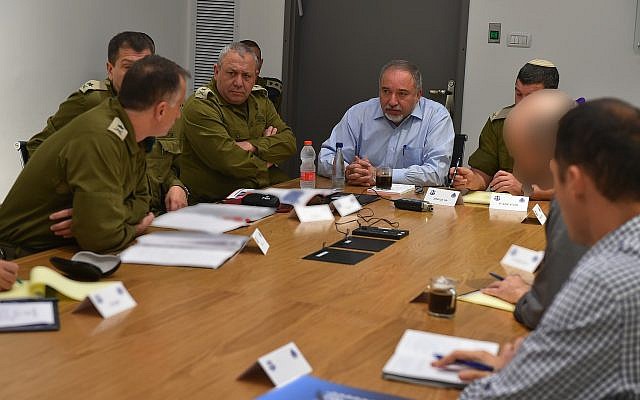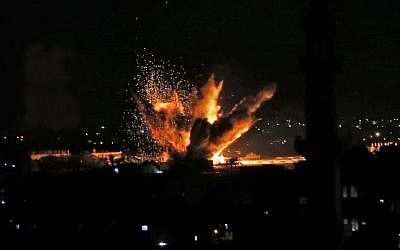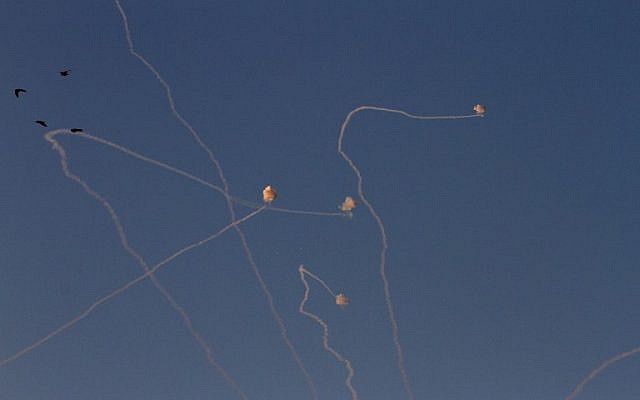PM says public isn’t privy to considerations behind heavily criticized deal with Hamas that headed off military campaign

Prime Minister Benjamin Netanyahu on Wednesday defended his decision to accept a ceasefire with terror groups in Gaza after the worst escalation in violence in the Strip since 2014.
“In times of emergency, when making decisions crucial to security, the public can’t always be privy to the considerations that must be hidden from the enemy,” he said at a ceremony in honor of Israel’s first prime minister David Ben-Gurion.
“Our enemies begged for a ceasefire and they knew very well why,” he added.
The deal has provoked criticism from within Netanyahu’s government as well as from Israelis who live near the Gaza Strip and want further action against Hamas, the terror group that rules the enclave.
Defense Minister Avigdor Liberman on Wednesday announced a special faction meeting of his Yisrael Beytenu party at noon, after which he is expected to deliver a statement to the media, amid swirling rumors that he will resign over the ceasefire with Hamas.
Hebrew news outlets quoted sources in Jewish Home who said that the party’s leader, Education Minister Naftali Bennett, will demand the defense portfolio.
Liberman has clashed frequently with Bennett, whose religious-nationalist Jewish Home party will compete with Liberman’s secular right-wing Yisrael Beytenu over the votes of many hawkish Israelis in the upcoming Knesset elections.

The two men have traded barbs several times in recent weeks, with Bennett accusing Liberman of being soft on Gaza and Liberman replying in kind, while also asserting that policy decisions regarding the ongoing violence emanating from the Strip were made by the ministers in the high-level security cabinet rather than his office.
A senior cabinet member told Channel 10 news that Liberman is expected to announce he is stepping down after weeks of disagreements with Netanyahu about the proper course of action in the Gaza Strip.
“He is currently choosing between the end of his career if he stays in his position, and a slight chance of rehabilitating his public image if he resigns,” the unnamed minister was quoted as saying.
Sources close to the defense minister told Haaretz that he was “incensed” by Netanyahu’s briefing, which appeared to indicate that Liberman supported the reported ceasefire.
The security cabinet reportedly agreed to a ceasefire with Hamas on Tuesday afternoon, in a decision that several cabinet ministers later said they opposed. The decision was slammed by some opposition leaders, who called it a capitulation to terror after a deadly two-day conflagration that saw over 400 rockets and mortar shells fired at southern Israel.

Channel 10 reported that at least four senior ministers who attended the cabinet meeting opposed the decision, which was made by Netanyahu without a vote. But Housing Minister Yoav Gallant, who was at the meeting, said the ministers all accepted the decision.
The ceasefire was hailed by Hamas as a victory ostensibly imposed on Israel on Hamas’s terms. Rocket fire at Israel came to a halt on Tuesday afternoon, after two days of incessant attacks.
Liberman, Justice Minister Ayelet Shaked, Environmental Protection Minister Ze’ev Elkin, and Education Minister Naftali Bennett proposed an alternative response, but it was rejected by the other ministers at the meeting, according to Channel 10.
An unnamed minister who attended the seven-hour meeting Tuesday told the outlet that no vote was held to determine the next steps. A source with direct knowledge of the discussions confirmed to The Times of Israel that no vote took place.
The source said there were several disagreements between cabinet members, some of which were the focus of debate for “a number of hours.” The source would not, however, comment on the content of the disagreements.

At the conclusion of the meeting, the security cabinet merely released a statement that read: “The security cabinet discussed the events in the south. The cabinet received briefings from the IDF and defense officials on the [IDF] strikes and widespread operations against terror targets in Gaza. The cabinet instructed the IDF to continue its strikes as needed.”
Hamas and other Gaza terror groups said earlier Tuesday afternoon that they had accepted an Egyptian-mediated ceasefire with Israel. Terms of the deal were not immediately known, and there was no immediate comment from Jerusalem. But a senior Israeli diplomatic official appeared to confirm the reported armistice.
“Israel maintains its right to act. Requests from Hamas for a ceasefire came through four different mediators. Israel responded that the events on the ground will decide [whether a ceasefire will go into effect],” the official said, on condition of anonymity.
Hadashot TV news said Egypt’s President Abdel-Fattah el-Sissi had urged Israel behind the scenes to accept the ceasefire.

According to the military, over 460 rockets and mortar shells were fired at southern Israel over the course of 25 hours on Monday and Tuesday. The Iron Dome missile defense system intercepted over 100 of them. Most of the rest landed in open fields, but dozens landed inside Israeli cities and towns, killing one person, injuring dozens more, and causing significant property damage.
In response to the rocket and mortar attacks, the Israeli military said it targeted approximately 160 sites in the Gaza Strip connected to the Hamas and Palestinian Islamic Jihad terror groups, including four facilities that the army designated as “key strategic assets.”
As news of a ceasefire broke, Liberman’s office put out a statement saying that any claim that he had backed ending Israel’s offensive was “fake news. The defense minister’s position is consistent and has not changed.”
Similarly, Bennett’s office said any reports that he had supported a halt to strikes were “an absolute lie” and that the minister had “presented his resolute position to the cabinet that he has expressed in recent months and his plan for Gaza.”
As reported by The Times of Israel
